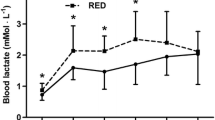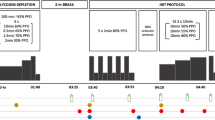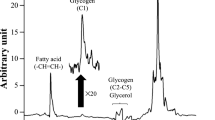Summary
Three female and three male highly trained endurance runners with mean maximal oxygen uptake (VO2max) values of 60.5 and 71.5 ml·kg−1·min−1, respectively, ran to exhaustion at 75%–80% of VO2max on two occasions after an overnight fast. One experiment was performed after a normal diet and training regimen (Norm), the other after a diet and training programme intended to increase muscle glycogen levels (Carb). Muscle glycogen concentration in the gastrocnemius muscle increased by 25% (P<0.05) from 581 mmol·kg−1 dry weight, SEM 50 to 722 mmol·kg−1 dry weight, SEM 34 after Carb. Running time to exhaustion, however, was not significantly different in Carb and Norm, 77 min, SEM 13 vs 70 min, SEM 8, respectively. The average glycogen concentration following exhaustive running was 553 mmol· kg−1 dry weight, SEM 70 in Carb and 434 mmol·kg−1 dry weight, SEM 57 in Norm, indicating that in both tests muscle glycogen stores were decreased by about 25%. Periodic acid-Schiff staining for semi-quantitative glycogen determination in individual fibres confirmed that none of the fibres appeared to be glycogen-empty after exhaustive running. The steady-state respiratory exchange ratio was higher in Carb than in Norm (0.92, SEM 0.01 vs 0.89, SEM 0.01; P<0.05). Since muscle glycogen utilization was identical in the two tests, the indication of higher utilization of total carbohydrate appears to be related to a higher utilization of liver glycogen. We have concluded that glycogen depletion of the gastrocnemius muscle is unlikely to be the cause of fatigue during exhaustive running at 75%–80% of VO2max in highly trained endurance runners. Furthermore, diet- and training-induced carbohydrate supercompensation does not appear to improve endurance capacity in such individuals.
Similar content being viewed by others
References
Ahlborg BG, Bergström J, Brohult J, Ekelund L-G, Hultman E, Maschio G (1967) Human muscle glycogen content and capacity for prolonged exercise at different diets. Försvarsmedicin 3:85–99
Belcastro A, Maclean I, Gilchrist J (1985) Biochemical basis of muscular fatigue associated with repetitious contractions of skeletal muscle. Int J Biochem 17:447–453
Bergmeyer HU, Bernt E, Schmidt F, Stork H (1974) D-glucose. Determination with hexokinase and glucose-6-phosphate dehydrogenase. In: Bergmeyer HU (ed) Methods of enzymatic analysis, 2nd edn. Academic Press, New York, pp 1196–1201
Bergström J (1962) Muscle electrolytes in man. Determined by neutron activation analyses on needle biopsy specimens. A study on normal subjects, kidney patients and patients with chronic diarrhoea. Scand J Clin Lab Invest 14 [Suppl 68]:1–110
Bergström J, Hultman E (1967) A study of the glycogen metabolism during exercise in man. Scand J Clin Lab Invest 19:218–228
Bergström J, Hermansen L, Hultman E, Saltin B (1967) Diet, muscle glycogen and physical performance. Acta Physiol Scand 71:140–150
Bergström J, Hultman E, Roch-Norlund AE (1972) Muscle glycogen synthase in normal subjects. Basal values and effect of glycogen depletion by exercise and of a carbohydrate-rich diet following exercise. Scand J Clin Lab Invest 29:231–236
Bianchi C, Narayan S (1982) Muscle fatigue and the role of transverse tubules. Science 215:295–296
Brewer J, Williams C, Patton A (1988) The influence of high carbohydrate diets on endurance running performance. Eur J Appl Physiol 57:698–706
Brooke M, Kaiser K (1970) Three “myosin ATPase” systems. The nature of their pH lability and sulfhydryl dependence. J Histochem Cytochem 18:670–672
Conley D, Krahenbuhl G (1980) Running economy and distance running performance of highly trained athletes. Med Sci Sports Exerc 12:357–360
Costill DL, Sparks K, Gregor R, Turner C (1971) Muscle glycogen utilization during exhaustive running. J Appl Physiol 31:353–356
Costill DL, Gollnick PD, Jansson ED, Saltin B, Stein EM (1973) Glycogen depletion pattern in human muscle fibers during distance running. Acta Physiol Scand 89:374–383
Costill DL, Jansson E, Gollnick PD, Saltin B (1974) Glycogen utilization in leg muscle of men during level and uphill running. Acta Physiol Scand 91:475–481
Costill DL, Blom P, Hermansen L (1981) Influence of acute exercise and endurance training on muscle glycogen storage. Med Sci Sports Exerc 13:90A
Costill DL, Pearson DR, Fink WJ (1988) Impaired muscle glycogen storage after muscle biopsy. J Appl Physiol 64:2245–2248
Daniels J, Scardina N, Hayes J, Foley P (1984) Variations in VO2 submax during treadmill running. Med Sci Sports Exerc 16:108A
Essén B (1977) Intramuscular substrate utilization during prolonged exercise. Ann NY Acad Sci 301:30–44
Galbo H, Hoist HH, Christensen NJ (1979) The effect of different diets and insulin on the hormonal response to prolonged exercise. Acta Physiol Scand 107:19–32
Goforth HW, Hogdon JA, Hilderbrad RL (1980) A double blind study of the effects of carbohydrate loading upon endurance performance. Med Sci Sports Exerc 12:108A
Gollnick PD, Piehl K, Saubert CW, Armstrong RB, Saltin B (1972) Diet, exercise and glycogen changes in human muscle fibers. J Appl Physiol 33:421–425
Gollnick PD, Armstrong RB, Saubert CW, Sembrowich WL, Shepherd RE, Saltin B (1973) Glycogen depletion patterns in human skeletal muscle fibers during prolonged work. Pflügers Arch 344:1–12
Gollnick PD, Pernow B, Essén B, Jansson E, Saltin B (1980) Availability of glycogen and plasma FFA and substrate utilization in leg muscle of man during exercise. Clin Physiol 1:1–22
Hermansen L, Hultman E, Saltin B (1967) Muscle glycogen during prolonged severe exercise. Acta Physiol Scand 71:129–139
Hultman E (1967) Studies on muscle metabolism of glycogen and active phosphate in man with special reference to exercise and diet. Scand J Clin Lab Invest 19 [Suppl 94]:1–63
Hultman E, Bergström J, Roch-Norlund AE (1971) Glycogen stores in human skeletal muscle. Adv Exp Med Biol 11:273–288
Karlsson J, Saltin B (1971) Diet, muscle glycogen and endurance performance. J Appl Physiol 31:203–206
Karlsson J, Diamant B, Saltin B (1971) Muscle metabolites during submaximal and maximal exercise in man. Scand J Clin Lab Invest 26:385–394
Karlsson J, Nordesjö LO, Saltin B (1974) Muscle glycogen utilization during exercise after physical training. Acta Physiol Scand 90:210–217
Morgan D, Baldini F, Martin P (1987) Day-to-day stability in running economy and step length among well-trained runners. Int J Sports Med 8:242A
Pearse AGE (1961) Histochemistry — theoretical and applied. Little Brown, Boston, Mass., appendix 9, p 832
Piehl K, Adolfsson S, Nazar K (1974) Glycogen storage and glycogen synthetase in trained and untrained muscle of man. Acta Physiol Scand 90:779–788
Richter EA, Galbo H (1986) High glycogen levels enhance glycogen breakdown in isolated contracting skeletal muscle. J Appl Physiol 61:827–831
Sahlin K, Broberg S (1989) Release of potassium from muscle during prolonged dynamic exercise. Acta Physiol Scand 136:293–294
Saltin B, Hermansen L (1967) Glycogen stores and prolonged severe exercise. In: Blix G (ed) Nutrition and physical activity. Almqvist and Wiksells, Uppsala, pp 32–46
Saltin B, Karlsson J (1971) Muscle glycogen utilization during work of different intensities. Adv Exp Med Biol 11:289–299
Sherman WM, Costill DL, Fink WJ, Miller JM (1981) The effect of exercise and diet manipulation on muscle glycogen and its subsequent utilization during performance. Int J Sports Med 2:114–118
Sjøgaard G (1986) Water and electrolyte fluxes during exercise and their relation to muscle fatigue. Acta Physiol Scand 128 [Suppl 556]:129–136
Taylor AW (1975) The effects of exercise and training on the activities of human skeletal muscle glycogen cycle enzymes. In: Howald H, Poortmans JR (eds) Metabolic adaptation to prolonged physical exercise. Birkhauser, Basle, pp 416–421
Author information
Authors and Affiliations
Rights and permissions
About this article
Cite this article
Madsen, K., Pedersen, P.K., Rose, P. et al. Carbohydrate supercompensation and muscle glycogen utilization during exhaustive running in highly trained athletes. Europ. J. Appl. Physiol. 61, 467–472 (1990). https://doi.org/10.1007/BF00236069
Accepted:
Issue Date:
DOI: https://doi.org/10.1007/BF00236069




